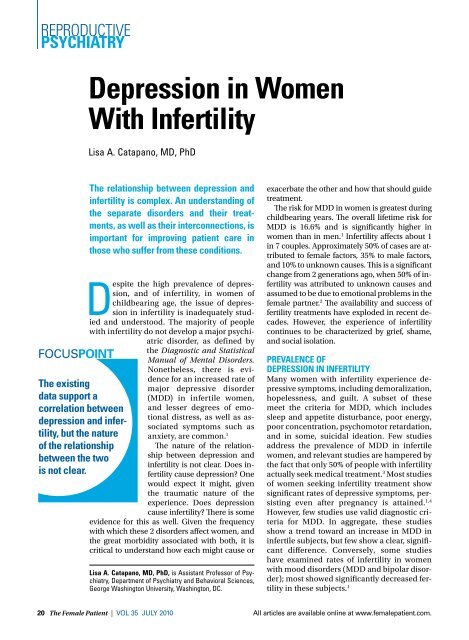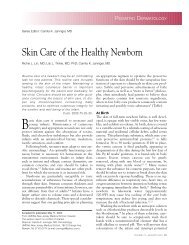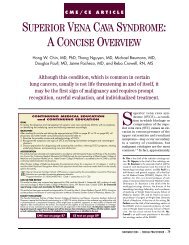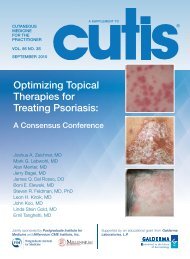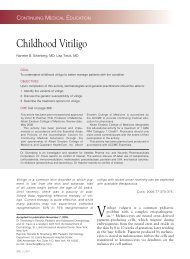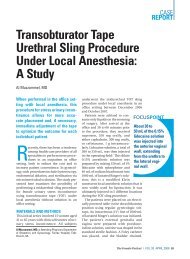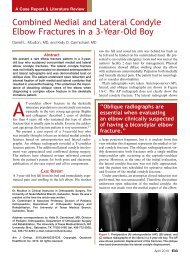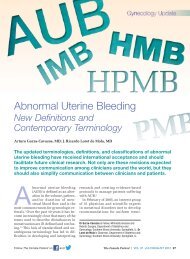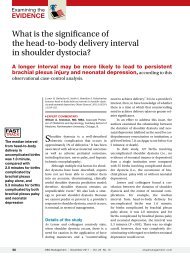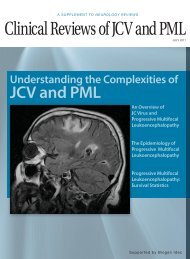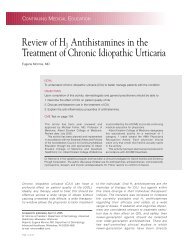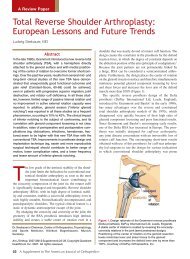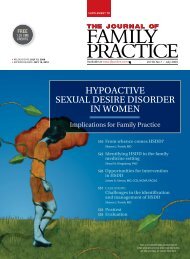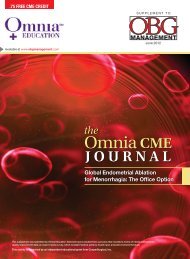Depression in Women With Infertility
Depression in Women With Infertility
Depression in Women With Infertility
Create successful ePaper yourself
Turn your PDF publications into a flip-book with our unique Google optimized e-Paper software.
REPRODUCTIVE<br />
PSYCHIATRY<br />
<strong>Depression</strong> <strong>in</strong> <strong>Women</strong><br />
<strong>With</strong> <strong>Infertility</strong><br />
Lisa A. Catapano, MD, PhD<br />
FOCUSPOINT<br />
Despite the high prevalence of depression,<br />
and of <strong>in</strong>fertility, <strong>in</strong> women of<br />
childbear<strong>in</strong>g age, the issue of depression<br />
<strong>in</strong> <strong>in</strong>fertility is <strong>in</strong>adequately studied<br />
and understood. The majority of people<br />
with <strong>in</strong>fertility do not develop a major psychiatric<br />
disorder, as def<strong>in</strong>ed by<br />
The exist<strong>in</strong>g<br />
data support a<br />
correlation between<br />
depression and <strong>in</strong>fertility,<br />
but the nature<br />
of the relationship<br />
between the two<br />
is not clear.<br />
The relationship between depression and<br />
<strong>in</strong>fertility is complex. An understand<strong>in</strong>g of<br />
the separate disorders and their treatments,<br />
as well as their <strong>in</strong>terconnections, is<br />
important for improv<strong>in</strong>g patient care <strong>in</strong><br />
those who suffer from these conditions.<br />
the Diagnostic and Statistical<br />
Manual of Mental Disorders.<br />
Nonetheless, there is evidence<br />
for an <strong>in</strong>creased rate of<br />
major depressive disorder<br />
(MDD) <strong>in</strong> <strong>in</strong>fertile women,<br />
and lesser degrees of emotional<br />
distress, as well as associated<br />
symptoms such as<br />
anxiety, are common. 1<br />
The nature of the relationship<br />
between depression and<br />
<strong>in</strong>fertility is not clear. Does <strong>in</strong>fertility<br />
cause depression? One<br />
would expect it might, given<br />
the traumatic nature of the<br />
experience. Does depression<br />
cause <strong>in</strong>fertility? There is some<br />
evidence for this as well. Given the frequency<br />
with which these 2 disorders affect women, and<br />
the great morbidity associated with both, it is<br />
critical to understand how each might cause or<br />
Lisa A. Catapano, MD, PhD, is Assistant Professor of Psychiatry,<br />
Department of Psychiatry and Behavioral Sciences,<br />
George Wash<strong>in</strong>gton University, Wash<strong>in</strong>gton, DC.<br />
exacerbate the other and how that should guide<br />
treatment.<br />
The risk for MDD <strong>in</strong> women is greatest dur<strong>in</strong>g<br />
childbear<strong>in</strong>g years. The overall lifetime risk for<br />
MDD is 16.6% and is significantly higher <strong>in</strong><br />
women than <strong>in</strong> men. 1 <strong>Infertility</strong> affects about 1<br />
<strong>in</strong> 7 couples. Approximately 50% of cases are attributed<br />
to female factors, 35% to male factors,<br />
and 10% to unknown causes. This is a significant<br />
change from 2 generations ago, when 50% of <strong>in</strong>fertility<br />
was attributed to unknown causes and<br />
assumed to be due to emotional problems <strong>in</strong> the<br />
female partner. 2 The availability and success of<br />
fertility treatments have exploded <strong>in</strong> recent decades.<br />
However, the experience of <strong>in</strong>fertility<br />
cont<strong>in</strong>ues to be characterized by grief, shame,<br />
and social isolation.<br />
PREVALENCE OF<br />
DEPRESSION IN INFERTILITY<br />
Many women with <strong>in</strong>fertility experience depressive<br />
symptoms, <strong>in</strong>clud<strong>in</strong>g demoralization,<br />
hopelessness, and guilt. A subset of these<br />
meet the criteria for MDD, which <strong>in</strong>cludes<br />
sleep and appetite disturbance, poor energy,<br />
poor concentration, psychomotor retardation,<br />
and <strong>in</strong> some, suicidal ideation. Few studies<br />
address the prevalence of MDD <strong>in</strong> <strong>in</strong>fertile<br />
women, and relevant studies are hampered by<br />
the fact that only 50% of people with <strong>in</strong>fertility<br />
actually seek medical treatment. 3 Most studies<br />
of women seek<strong>in</strong>g <strong>in</strong>fertility treatment show<br />
significant rates of depressive symptoms, persist<strong>in</strong>g<br />
even after pregnancy is atta<strong>in</strong>ed. 1,4<br />
However, few studies use valid diagnostic criteria<br />
for MDD. In aggregate, these studies<br />
show a trend toward an <strong>in</strong>crease <strong>in</strong> MDD <strong>in</strong><br />
<strong>in</strong>fertile subjects, but few show a clear, significant<br />
difference. Conversely, some studies<br />
have exam<strong>in</strong>ed rates of <strong>in</strong>fertility <strong>in</strong> women<br />
with mood disorders (MDD and bipolar disorder);<br />
most showed significantly decreased fertility<br />
<strong>in</strong> these subjects. 1<br />
20 The Female Patient | VOL 35 JULY 2010 All articles are available onl<strong>in</strong>e at www.femalepatient.com.
Catapano<br />
RELATIONSHIP BETWEEN<br />
DEPRESSION AND INFERTILITY<br />
The exist<strong>in</strong>g data support a correlation between<br />
depression and <strong>in</strong>fertility, but the nature of the<br />
relationship between the two is not clear. Evidence<br />
that <strong>in</strong>fertility causes depression is suggestive,<br />
but not def<strong>in</strong>itive. Aga<strong>in</strong>, most studies <strong>in</strong>vestigate<br />
depressive symptoms rather than MDD.<br />
The numerous studies that demonstrate an association<br />
between depressive symptoms and <strong>in</strong>fertility<br />
do not provide evidence of causality. A few<br />
have exam<strong>in</strong>ed rates of depression <strong>in</strong> newly diagnosed<br />
<strong>in</strong>fertile women. 1 Such studies are <strong>in</strong>tended<br />
to identify cases <strong>in</strong> which depression<br />
predates <strong>in</strong>fertility; however, women with newly<br />
diagnosed <strong>in</strong>fertility, by def<strong>in</strong>ition, have been<br />
try<strong>in</strong>g unsuccessfully to get pregnant for at least<br />
one year, so the time course of the depression<br />
relative to the <strong>in</strong>fertility is not known. In any case,<br />
the results of these studies are mixed. Many studies<br />
show a correlation between depression and<br />
length of <strong>in</strong>fertility treatment (and, therefore, <strong>in</strong>fertility).<br />
1 Others show an association between<br />
depression and poor outcome of fertility treatment.<br />
2 Both are suggestive of causality.<br />
Similarly, there is circumstantial evidence that<br />
depression may cause or exacerbate <strong>in</strong>fertility.<br />
For example, several studies show that the presence<br />
of depressive symptoms <strong>in</strong> patients undergo<strong>in</strong>g<br />
assisted reproductive techniques (ART) is<br />
associated with lower pregnancy rates. A number<br />
of studies have demonstrated menstrual abnormalities<br />
<strong>in</strong> women with mood disorders. 1 These<br />
studies do not address causality but provide a<br />
possible biologic mechanism by which MDD<br />
may reduce fertility. Another potential mechanism<br />
is behavioral: Neurovegetative symptoms of<br />
MDD—decreased energy, decreased libido, poor<br />
self-care, and psychomotor retardation—might<br />
be expected to reduce fertility, but there are no<br />
studies that directly address this theory.<br />
A related set of questions, critical from a treatment<br />
perspective, emerge: Do depression treatments<br />
cause (or exacerbate) <strong>in</strong>fertility? Do <strong>in</strong>fertility<br />
treatments cause depression?<br />
Two small studies <strong>in</strong>vestigated the effect of selective<br />
seroton<strong>in</strong> reuptake <strong>in</strong>hibitors on fertility <strong>in</strong><br />
women undergo<strong>in</strong>g ART and showed a decrease<br />
<strong>in</strong> pregnancy and birth rates that was not statistically<br />
significant. 5,6 One meta-analysis showed a<br />
significant <strong>in</strong>crease <strong>in</strong> miscarriages associated<br />
with antidepressants, although the effect of MDD<br />
itself could not be ruled out. 7<br />
What are the effects of <strong>in</strong>fertility treatments on<br />
depression? As noted above, studies that show<br />
FOCUSPOINT<br />
For many<br />
depressed and<br />
<strong>in</strong>fertile patients,<br />
the primary (but often<br />
unspoken) goal of<br />
psychiatric care is<br />
not to treat depression<br />
but to get<br />
pregnant.<br />
<strong>in</strong>creased rates of depression <strong>in</strong><br />
women undergo<strong>in</strong>g fertility<br />
treatment are unable to separate<br />
out the effects of <strong>in</strong>fertility.<br />
However, many fertility medications<br />
have known effects on<br />
mood. Clomiphene citrate, the<br />
most commonly used fertility<br />
drug, has side effects that <strong>in</strong>clude<br />
anxiety, irritability, and<br />
mood sw<strong>in</strong>gs, similar to premenstrual<br />
syndrome. Progesterone<br />
and progesterone-conta<strong>in</strong><strong>in</strong>g<br />
oral contraceptive pills<br />
may cause depression and<br />
emotional lability. Gonadotrop<strong>in</strong>-releas<strong>in</strong>g<br />
hormone agonists,<br />
which down-regulate pituitary function,<br />
cause menopause-like symptoms, <strong>in</strong>clud<strong>in</strong>g<br />
depression. 2<br />
TREATMENT OF DEPRESSION IN INFERTILITY<br />
The treatment of MDD <strong>in</strong> <strong>in</strong>fertility is complicated<br />
by the need to consider the effects of chosen<br />
pharmacotherapies on (1) conception, (2)<br />
pregnancy, (3) neonatal health, and (4) breastfeed<strong>in</strong>g.<br />
As discussed above, antidepressants<br />
have not been shown to have a significant effect<br />
on fertility rates but may <strong>in</strong>crease the risk of<br />
miscarriage. 5-7<br />
The safety of antidepressants <strong>in</strong> pregnancy<br />
and the postpartum period is a widely discussed<br />
and controversial topic. A comprehensive discussion<br />
is beyond the scope of this review. In<br />
brief, accord<strong>in</strong>g to the most recent guidel<strong>in</strong>es<br />
published jo<strong>in</strong>tly by the American Psychiatric<br />
Association and ACOG, antidepressants are associated<br />
with reductions <strong>in</strong> birth weight, neonatal<br />
irritability (“poor neonatal adaptation”), and<br />
persistent pulmonary hypertension of the newborn.<br />
8 Accord<strong>in</strong>g to the report, the current data<br />
do not support an <strong>in</strong>creased risk of congenital<br />
malformations from antidepressant exposure.<br />
However, evidence for <strong>in</strong>creased risk of cardiac<br />
defects associated with paroxet<strong>in</strong>e has led many<br />
practitioners to restrict its use <strong>in</strong> women of<br />
childbear<strong>in</strong>g age. The guidel<strong>in</strong>es endorse antidepressant<br />
use <strong>in</strong> pregnant women with MDD,<br />
particularly when symptoms are severe or the<br />
patient has previously relapsed follow<strong>in</strong>g antidepressant<br />
discont<strong>in</strong>uation.<br />
Psychotherapy is a powerful, safe, and effective<br />
tool <strong>in</strong> women who are pregnant or try<strong>in</strong>g to become<br />
pregnant. Interpersonal, group, and cognitive<br />
behavioral therapies have been proven<br />
Follow The Female Patient on and The Female Patient | VOL 35 JULY 2010 21
REPRODUCTIVEPSYCHIATRY<br />
<strong>Depression</strong> <strong>in</strong> <strong>Women</strong> <strong>With</strong> <strong>Infertility</strong><br />
FOCUSPOINT<br />
Patients who<br />
suffer from depression<br />
and <strong>in</strong>fertility<br />
easily fall <strong>in</strong>to the<br />
assumption that<br />
their depressive<br />
symptoms will<br />
resolve once they<br />
are pregnant.<br />
effective for depression <strong>in</strong> patients with <strong>in</strong>fertility<br />
<strong>in</strong> a number of studies, although one recent<br />
meta-analysis did not show a significant effect. 8,9<br />
Psychotherapy provides a<br />
means to address the significant<br />
themes <strong>in</strong> <strong>in</strong>fertility: loss,<br />
grief, guilt, shame, anger, identity,<br />
self-esteem, social isolation,<br />
marital discord, and sexual<br />
dysfunction.<br />
It is worthwhile not<strong>in</strong>g that for<br />
many depressed and <strong>in</strong>fertile<br />
patients, the primary (but often<br />
unspoken) goal of psychiatric<br />
care is not to treat depression<br />
but to get pregnant. There is<br />
some evidence, <strong>in</strong> fact, that psychotherapy<br />
leads to <strong>in</strong>creased<br />
pregnancy rates. 9 Clearly this is<br />
an issue that warrants further<br />
exploration.<br />
PREGNANCY AFTER INFERTILITY<br />
Patients who suffer from depression and <strong>in</strong>fertility<br />
commonly attribute their depression to their<br />
<strong>in</strong>ability to have a child, and they easily fall <strong>in</strong>to<br />
the assumption that their depressive symptoms<br />
will resolve once they are pregnant. In fact, the<br />
risk for depression <strong>in</strong> pregnancy may be higher<br />
<strong>in</strong> women who experienced <strong>in</strong>fertility. 4 A key<br />
theme <strong>in</strong> psychotherapy with previously <strong>in</strong>fertile<br />
patients is proper acknowledgement of their<br />
losses, which are not nullified upon pregnancy<br />
or the birth of a healthy <strong>in</strong>fant. These <strong>in</strong>clude<br />
loss of opportunity for spontaneous pregnancy;<br />
possible loss of genetic connection to the baby;<br />
and <strong>in</strong>jury to marriage, friendships, and career<br />
dur<strong>in</strong>g the course of <strong>in</strong>fertility.<br />
Pregnant women with a history of <strong>in</strong>fertility<br />
often experience persistent feel<strong>in</strong>gs of <strong>in</strong>adequacy<br />
with respect to their reproductive capacity,<br />
associated with a belief that their <strong>in</strong>fertility was a<br />
sign that they do not deserve to be a parent. In<br />
patients with such beliefs, conceiv<strong>in</strong>g through<br />
ART, while circumvent<strong>in</strong>g <strong>in</strong>fertility, does not correct<br />
their perceived underly<strong>in</strong>g deficits. These<br />
feel<strong>in</strong>gs may persist <strong>in</strong>to parenthood. The opportunity<br />
to address these feel<strong>in</strong>gs <strong>in</strong> psychotherapy<br />
should not be missed.<br />
CONCLUSION<br />
The relationship between depression and <strong>in</strong>fertility<br />
is complex. There is evidence that major<br />
depression (and its pharmacologic treatments)<br />
may reduce fertility, and that <strong>in</strong>fertility (and its<br />
treatments) may cause major depression. This<br />
clearly complicates management of patients<br />
with both MDD and <strong>in</strong>fertility, requir<strong>in</strong>g cl<strong>in</strong>icians<br />
to strike a delicate balance between effectively<br />
treat<strong>in</strong>g each disorder and not exacerbat<strong>in</strong>g<br />
the other. A clearer understand<strong>in</strong>g of the<br />
relationship between these disor ders, and their<br />
treatments, is critical. Future studies should not<br />
overlook the po<strong>in</strong>t that the majority of <strong>in</strong>fertile<br />
women do not develop depression. Understand<strong>in</strong>g<br />
sources of vulnerability and resilience may<br />
ultimately be key to improv<strong>in</strong>g mental health <strong>in</strong><br />
women with <strong>in</strong>fertility.<br />
The author reports no actual or potential conflict<br />
of <strong>in</strong>terest <strong>in</strong> relation to this article.<br />
Acknowledgement: The author acknowledges<br />
Dr Joan Liebermann for helpful comments on<br />
the manuscript.<br />
REFERENCES<br />
1. Williams KE, Marsh WK, Rasgon NL. Mood disorders and<br />
fertility <strong>in</strong> women: a critical review of the literature and<br />
implications for future research. Hum Reprod Update.<br />
2007;13(6):607-616.<br />
2. Burns LH. Psychiatric aspects of <strong>in</strong>fertility and <strong>in</strong>fertility<br />
treatments. Psychiatr Cl<strong>in</strong>ic North Am. 2007;30(4):689-716.<br />
3. Chandra A, Mart<strong>in</strong>ez GM, Mosher WD, Abma JC, Jones J.<br />
Fertility, family plann<strong>in</strong>g, and reproductive health of U.S.<br />
women: data from the 2002 National Survey of Family<br />
Growth. National Center for Health Statistics. Vital Health<br />
Stat 23. 2005;(25):1-160.<br />
4. Monti F, Agnost<strong>in</strong>i F, Fagand<strong>in</strong>i P, La Sala GB, Blickste<strong>in</strong> I.<br />
Depressive symptoms dur<strong>in</strong>g late pregnancy and early parenthood<br />
follow<strong>in</strong>g assisted reproductive technology. Fertil<br />
Steril. 2009;91(3):851-857.<br />
5. Friedman BE, Rogers JL, Shah<strong>in</strong>e LK, Westphal LM, Lathi RB.<br />
Effect of selective seroton<strong>in</strong> reuptake <strong>in</strong>hibitors on <strong>in</strong> vitro<br />
fertilization outcome. Fertil Steril. 2009;92(4):1312-1314.<br />
6. Klock SC, She<strong>in</strong><strong>in</strong> S, Kazer R, Zhang X. A pilot study of the<br />
relationship between selective seroton<strong>in</strong> reuptake <strong>in</strong>hibitors<br />
and <strong>in</strong> vitro fertilization outcome. Fertil Steril. 2004;82(4):<br />
968-969.<br />
7. Hemels ME, E<strong>in</strong>arson A, Koren G, Lanctôt KL, E<strong>in</strong>arson TR.<br />
Antidepressant use dur<strong>in</strong>g pregnancy and the rates of spontaneous<br />
abortions: a meta-analysis. Ann Pharmacother.<br />
2005;39(5):803-809.<br />
8. Yonkers KA, Wisner KL, Stewart DE, et al. The management<br />
of depression dur<strong>in</strong>g pregnancy: a report from the American<br />
Psychiatric Association and the American College of Obstetricians<br />
and Gynecologists. Gen Hosp Psychiatry. 2009;31(5):<br />
403-413.<br />
9. Hämmerli K, Znoj H, Barth J. The efficacy of psychological<br />
<strong>in</strong>terventions for <strong>in</strong>fertile patients: a meta-analysis exam<strong>in</strong><strong>in</strong>g<br />
mental health and pregnancy rate. Hum Reprod Update.<br />
2009;15(3):279-295.<br />
For a patient handout on depression <strong>in</strong><br />
women with <strong>in</strong>fertility, please go to page 49<br />
for English or page 50 for Spanish. Patient<br />
handouts can also be accessed onl<strong>in</strong>e at<br />
www.femalepatient.com/html/han/han.asp.<br />
22 The Female Patient | VOL 35 JULY 2010 All articles are available onl<strong>in</strong>e at www.femalepatient.com.


